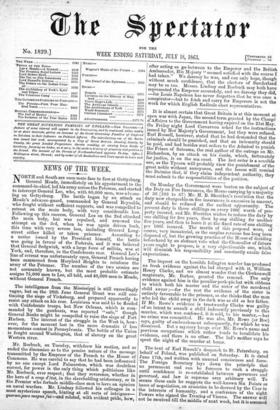Mr. Roebuck, on Tuesday, withdrew his motion, and so ended
the discussion as to the precise nature of the message transmitted by the Emperor of the French to the House of Commons. He was careful to any that he had been influenced by no one except Lord Palmerston, which was doubtless correct, for power is the only thing which politicians like Mr. Roebuck, ever respect; that they reverence, whether in the hero of a coup d'état, in the slaveholding aristocracy, or in the Premier who forbade middle-class men to have an opinion on naval warfare. Mr. Lindsay followed his colleague in a most mysterious speech, hinting at all sorts of intrigues- rierumpars magna fui—and related, with evident pride, how, after acting as go-between to the Emperor and the British Ambassador, His Majesty "seemed satisfied with the course I had taken." We daresay he was, and can only hope, though without much confidence, that the electors of Sunderland may be so too. Messrs. Lindsay and Roebuck may both have represented the Emperor accurately, and we daresay they did, —for Louis Napoleon has never forgotten that he was once a conspirator—but to fetch and carry for Emperors is not the work for which English Radicals elect representatives.






























